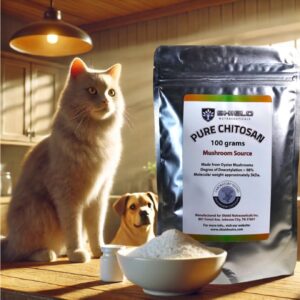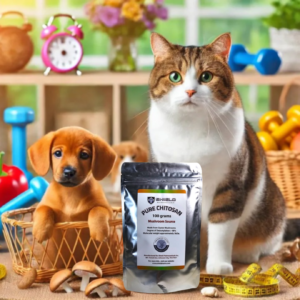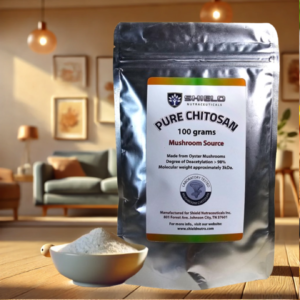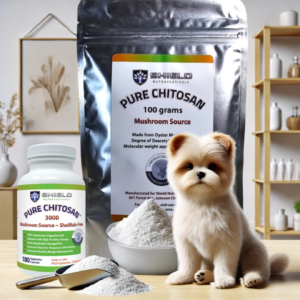Mushroom Chitosan in Pet Health



1. What is Mushroom Chitosan?
Mushroom chitosan is a natural biopolymer extracted from the cell walls of fungi. It’s derived from chitin, a structural component that gives mushrooms their rigidity and form.
Origin and Abundance
- Chitin is the second most abundant natural polysaccharide in nature, after cellulose.
- Most fungi contain 5%-7% chitin in their cell walls.
- Chitin is also found in the exoskeletons of crustaceans (crabs, shrimp, lobsters) and insects.
Mushroom Chitosan Pronunciation Guide for Pet Owners
- Chitin: Pronounced “KITE-in” (emphasis on “kite”)
- Deacetylation: Pronounced “dee-a-SETTLE-ay-shun” (emphasis on “dee”)
- Acetyl: Pronounced “A-see-tl” (emphasis on “see”)
Chemical Structure and Properties
Chitosan is obtained through a process called deacetylation of chitin. This involves:
- Removing acetyl groups (CH3OH) from the chitin molecule
- Creating a polymer with free amine groups (NH2)
This chemical transformation gives chitosan its positive charge, differentiating it from its parent compound, chitin.
- Solubility: Unlike chitin, chitosan is soluble in acidic to neutral solutions, making it more versatile for various applications. Our food grade mushroom chitosan oligosaccharide is soluble in water at any pH. It is bactericidal at pH 6.4 and below. To purchase wholesale, click HERE
- Biocompatibility and Biodegradability: Chitosan is known for its excellent biocompatibility and biodegradability. It’s non-toxic and can be broken down by natural biological processes.
Uses and Applications:
Chitosan, a versatile biopolymer derived from chitin, has found widespread applications across multiple industries due to its unique properties. This biodegradable and non-toxic compound offers a range of benefits in various sectors:
- Healthcare and Pharmaceuticals: Chitosan’s biocompatibility makes it invaluable in medical applications. It is used in wound healing products, drug delivery systems, and as a biomaterial in tissue engineering. Its ability to promote healing and control drug release has made it a popular choice in the pharmaceutical industry.
- Environmental Protection: In water treatment, chitosan’s capacity to bind with heavy metals and other contaminants makes it an effective agent for purification processes. This property has led to its use in both industrial and municipal water treatment facilities.
- Agriculture: Farmers and agronomists utilize chitosan as a natural biostimulant and elicitor. It enhances plant growth and boosts resistance against pathogens, contributing to more sustainable agricultural practices.
- Food Industry: Chitosan serves multiple purposes in food production and preservation. It acts as an antimicrobial food additive and can be used to create edible films or coatings that extend the shelf life of perishable products.
- Beverage Production: In the alcoholic beverage industry, chitosan is employed for clarification of wines, beers, and whiskeys, helping to improve their clarity and stability.
- Dietary Supplements: The compound is also used in the production of dietary supplements, capitalizing on its potential health benefits.
- Plastics Industry: Chitosan’s biodegradable nature makes it an attractive option for developing eco-friendly plastic alternatives.

The wide-ranging applications of chitosan stem from its unique combination of biocompatibility, biodegradability, and non-toxicity. As research continues, it’s likely that even more uses for this versatile compound will be discovered across various industries.
Variants:
- Traditional Chitosan: Traditionally sourced from marine crustaceans.
- Mushroom Chitosan: Derived from fungal sources, offering an alternative for those seeking non-animal derived products.
Chitosan’s versatility, biodegradability, and non-toxic nature make it a valuable material across various industries, from healthcare to cosmetics. Its ability to be derived from non-animal sources also makes it an appealing option for vegetarian and vegan-friendly products.
2. What are the advantages of Mushroom Chitosan?
Mushroom Chitosan is a type of chitosan derived from the cell walls of fungi. It has several advantages over traditional chitosan derived from shellfish, including:
- 1. Vegan and vegetarian-friendly: Mushroom chitosan is an excellent alternative for individuals who avoid animal-based products, such as those who follow a vegan lifestyle.
- 2. Allergen-free: Traditional chitosan is derived from shellfish, which can cause allergic reactions in some people. Mushroom chitosan does not contain any shellfish-derived ingredients, making it an allergen-free option.
- 3. Purer: Mushroom chitosan is often considered to be purer than traditional chitosan because it is derived from a single source, whereas traditional chitosan can be contaminated with other shellfish-related substances.
- 4. Better solubility: Mushroom chitosan is more soluble than traditional chitosan, which makes it easier to incorporate into a variety of applications such as cosmetics, bioplastics, wound care and food.
- 5. Improved bioavailability: Some studies have suggested that mushroom chitosan has higher bioavailability compared to traditional chitosan, which means that it can be absorbed and utilized more effectively by the body.

Overall, mushroom chitosan offers several advantages over traditional chitosan, making it an attractive alternative for individuals and industries looking for a vegan, allergen-free, and more effective chitosan source.
3. What are the benefits, functions and dosage of chitosan for pets?
Mushroom chitosan, derived from non-animal sources such as fungi, is increasingly being explored for use in pet food, including for cats, dogs. Its benefits, functions, and recommended dosages in this context vary based on the intended purpose and the type of animal. The addition of pure chitosan powder to pet food at feeding time is as simple as emptying a 500mg capsule into their food once daily. You can obtain 90ct or 180ct Pure Chitosan, 500mg capsules HERE
Benefits of Mushroom Chitosan in Pet Food
- Digestive Health: Chitosan can aid in digestion and promote gut health.

- Immune System Support: May enhance the immune response, helping pets fight off infections and diseases.

- Weight Management: Has been known to help in weight management, possibly due to its ability to bind fats.

- Joint Health: Can contribute to joint health, potentially benefiting older pets with joint issues.

- Toxin Absorption: Its ability to bind toxins can be beneficial in preventing the absorption of harmful substances.

Functions in Pet
- As a Prebiotic: Supports the growth of beneficial gut bacteria.
- Binding Agent: Binds to fats and toxins, aiding in their excretion.
- Supporting Overall Health: Contributes to general well-being and vitality.
Dosage for Pets

- Dependent on Animal Size and Weight: Smaller pets require lower doses compared to larger ones.
- Varies by Product: Follow manufacturer’s recommendations, as the concentration and form of chitosan can differ.
- Consultation with a Vet: It’s essential to consult a veterinarian for proper dosage, especially if the pet has underlying health conditions or is on medication.
Important Considerations
- Allergy Considerations: Although mushroom chitosan is non-animal-based, it’s still important to monitor for any allergic reactions.
- Quality of Supplement: Ensure the supplement is sourced from a reputable manufacturer.
- Regulatory Compliance: Check that the supplement meets local regulatory standards for pet products.
While vegetal chitosan can offer various health benefits for pets, it’s crucial to use it under veterinary guidance to ensure it’s suitable and safe for the specific health needs of the animal.
4. What are the common forms of chitosan used in pet uses?
In pet uses, chitosan is utilized in several forms, each suited to different applications based on the needs of the animal. The common forms include:
- Powdered Chitosan: Often used as an additive in pet foods or as a component in supplement powders. It’s easily mixed with food, making it a convenient way to administer.

- Benefits: Easy to mix with pet food, supports digestive health and weight management.
- Function: Acts as a binding agent for fats, supports the gut flora.
- Dosage: Varies based on pet size; follow the manufacturer’s guidelines or vet’s advice.
- Formula Guideline: A small scoop (equivalent to about 1/8 teaspoon) per 10 pounds of body weight, mixed into food once daily.
- Customization: Adjust based on pet’s response and dietary needs.
- Chitosan Capsules or Tablets: For more precise dosage control, chitosan is available in the form of capsules or tablets. This form is suitable for pets that require a specific dosage or for owners who prefer a more straightforward method of supplementing their pet’s diet.

- Benefits: Precise dosage control, beneficial for specific health needs like joint support.
- Function: Used as a dietary supplement for overall health.
- Dosage: Usually based on the pet’s weight; exact dosage should be as per the product label or vet’s prescription.
- Formula Guideline: Typically, one capsule (dose as per the manufacturer, often around 250-500 mg) per 20-30 pounds of body weight, once or twice daily.
- Customization: Dosage may vary depending on the concentration of chitosan and the specific health condition being addressed.
- Chitosan-Enriched Pet Foods: Some pet foods are formulated with chitosan as a key ingredient, aiming to provide its benefits as part of the pet’s regular diet.

- Benefits: Convenient way to incorporate chitosan into the pet’s daily diet.
- Function: Provides general health benefits as part of regular nutrition.
- Dosage: The chitosan is pre-mixed in the food, so following the feeding guidelines on the product is sufficient.
- Formula Guideline: Follow the feeding guide on the pet food packaging, as chitosan content will already be factored into the overall nutritional profile.
- Customization: Ensure the overall diet remains balanced and meets all nutritional needs of the pet.
- Chitosan in Topical Applications: For external use, chitosan can be found in creams, gels, or sprays. These are used for skin and coat care, wound healing, or as part of flea and tick prevention strategies.

- Benefits: Good for skin health, wound healing, and coat care.
- Function: Applied externally, especially useful for skin irritations or injuries.
- Dosage: Apply as needed on the affected area; follow product instructions or vet’s advice.
- Formula Guideline: Apply a thin layer of the chitosan-containing product to the affected area. Frequency of application can vary from once to several times a day based on the severity of the condition.
- Customization: Observe the pet’s reaction to the product and adjust usage accordingly.
- Chitosan in Oral Hygiene Products: In products like dental chews or water additives, chitosan helps in maintaining oral health by reducing plaque formation and improving gum health.

- Benefits: Helps in dental care, reducing plaque and improving gum health.
- Function: Chitosan binds to oral bacteria and plaque.
- Dosage: Use according to the product’s instructions, suitable for regular use.
- Formula Guideline: For dental chews, one chew per day suitable for the pet’s size. For water additives, follow the recommended dilution ratio on the product label.
- Customization: Can be used as part of a daily dental hygiene routine.
General Considerations
- Consult a Veterinarian: Always advisable for precise dosing and to ensure it’s appropriate for the pet’s health condition.
- Monitor for Allergies: Although rare, some pets may have allergies to chitosan products.
- Quality of Products: Opt for high-quality, vet-recommended products to ensure safety and efficacy.
The dosage and frequency of chitosan use in pets should be tailored to the individual needs of the pet, keeping in mind factors like size, health conditions, and dietary requirements. When choosing a chitosan product for pets, it’s important to consider the pet’s size, dietary needs, and any specific health concerns. Consultation with a veterinarian is recommended to determine the most suitable form and dosage of chitosan for an individual pet’s requirements.
Important Notes
- Veterinary Advice: Always consult with a vet before starting any new supplement or treatment.
- Observation and Adjustment: Monitor the pet’s reaction and adjust the formula as needed.
- Quality and Safety: Choose products specifically designed for pets and approved by relevant authorities.
Remember, these are just general guidelines and should not replace professional veterinary advice. Each pet is unique, and their health needs can vary greatly.
5. Which type of chitosan is best in pet uses, acid-soluble chitosan, chitosan hydrochloride or chitosan oligosaccharide?
Choosing the most suitable type of chitosan for pet uses depends on the specific health needs of the pet and the intended application. Here’s a brief overview of acid-soluble chitosan, chitosan hydrochloride, and chitosan oligosaccharide to help determine which might be better for certain pet uses:
Acid-Soluble Chitosan
- Characteristics: Soluble in acidic environments, such as the stomach.
- Pet Uses: Useful for digestive health applications.
- Advantages: May aid in nutrient absorption and gut health.
- Considerations: Its acidity should be taken into account, especially for pets with sensitive digestive systems.
Chitosan Hydrochloride
- Characteristics: Water-soluble form, which can be advantageous for even dispersion in liquids.
- Pet Uses: Good for oral hygiene products or as a water additive.
- Advantages: Easy to administer; beneficial for dental health and can help in managing plaque.
- Considerations: Its hydrochloride form may interact with other medications or dietary components, so consultation with a veterinarian is crucial.
Chitosan Oligosaccharide
- Characteristics: Composed of smaller molecule chains, offering higher bioavailability and potentially more efficient absorption.
- Pet Uses: Suitable for general health supplements, including immune support and potentially joint health.
- Advantages: Potentially more effective due to better absorption.
- Considerations: Can be more expensive than other forms, and the effects may vary depending on the molecular weight and degree of deacetylation.
Conclusion
- Specific Needs and Conditions: The choice depends on the pet’s specific health requirements and any existing conditions. For instance, pets with digestive issues might benefit more from acid-soluble chitosan, while those needing dental health support may find chitosan hydrochloride more beneficial.
- Veterinary Guidance: It’s always best to consult with a veterinarian before choosing a chitosan product, as they can provide tailored advice based on the pet’s health history and dietary needs.
- Trial and Observation: Sometimes, a trial period with close observation can help determine which type of chitosan works best for a particular pet.
In summary, each type of chitosan has unique properties and potential uses in pet health, and the best choice varies depending on individual pet needs and the specific health benefits being targeted.
6. Mushroom chitosan in pet applications
Mushroom chitosan, sourced from fungi, can offer diverse health benefits for pets, including enhancing digestive and immune system health, aiding in weight management, and contributing to joint health. It’s available in various forms like powders, capsules, enriched pet foods, topical applications, and oral hygiene products, catering to different health needs and ease of administration.

When used in pet care, the dosage of chitosan varies with the pet’s size and specific health requirements, emphasizing the need for following manufacturer guidelines or consulting a veterinarian. Its use in pets not only supports overall health but also aligns with eco-friendly and sustainable pet care practices. References:
- https://www.sciencedirect.com/science/article/pii/S0032579120304570 Chitosan oligosaccharide as an effective feed additive to maintain growth performance, meat quality, muscle glycolytic metabolism, and oxidative status in yellow-feather broilers under heat stress.
Book a Free Consultation
If you don’t know what type of chitosan is best for your situation, Book an appointment. we will offer you an initial 30-minute consultation and product quotation at no charge.
